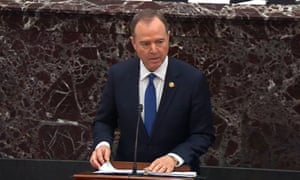- Adam Schiff: ‘History will not be kind to Donald Trump’
- Closing arguments after Republicans refused to call witnesses
- Impeachment trial: live coverage
Warning that “history will not be kind to Donald Trump,” the
Democratic representative Adam Schiff mounted an impassioned closing
argument in the Senate impeachment trial on Monday, urging the chamber
to hold the president to account.
The House impeachment managers, who are prosecuting Trump, pleaded
with Senate Republicansto find Trump guilty of the charges in the two
articles of impeachment: abuse of power and obstruction of Congress.“History will not be kind to Donald Trump,” Schiff said. “I think we all know that. And if you find that the House has proved his case and still vote to acquit, your name will be tied to his with a cord of steel for all of history.”
Schiff blasted Trump in personal terms, warning that Trump had tried to cheat in the 2020 election and will keep trying if acquitted.
“He has not changed. He will not change,” said Schiff. “A man without character or ethical compass will never find his way. He has done it before and he will do it again. What are the odds if he is left in office that he will continue to try to cheat? I will tell you: 100%.
“He will continue to try to cheat in the election until he succeeds. Then what shall you say?”
But a mostly party-line vote on Friday not to call witnesses in the trial signaled a lack of interest on the Republican side.
Trump maintains that his conduct has been irreproachable, and all but a handful of the 53 senators in the majority have seamlessly agreed.
“This is an effort to overturn the results of one election and to try to interfere in the coming election that begins today in Iowa,” White House counsel Pat Cipollone, who is leading Trump’s impeachment defense, told the chamber.
“The only appropriate result here is to acquit the president and to leave it to the voters to choose their president.”
The closing arguments set the stage for a vote to acquit Trump on Wednesday afternoon. The senators will hold separate votes on each article of impeachment, with an out-of-reach two-thirds majority needed to convict Trump and remove him from office.
The third president in US history to be impeached would then become the third president also to survive a Senate impeachment trial and remain in office. Andrew Johnson survived in 1868 and Bill Clinton survived in 1999. Neither then faced re-election, as Trump will in November.
With unusual rules requiring senators to maintain silence in the trial to this point – apart from what they might tell the media off the Senate floor – the members of the upper chamber finally had the chance to make speeches about the charges against Trump starting on Monday afternoon, when the trial adjourned temporarily for regular Senate business.
Chief Justice John Roberts, audibly nursing a cold, made another trip across the street from the supreme court to the Capitol on Monday morning to preside at the trial. He was scheduled to return for the acquittal vote on Wednesday afternoon.
Roberts may also visit the Capitol on Tuesday evening, when Trump is scheduled to deliver his State of the Union address.
Trump’s defense focused their closing argument on the urgency, they said, of keeping Trump’s name on the ballot in 2020.
“We place our faith in the Senate,” Cipollone said. “We place our faith in the Senate because we believe you will place your faith in the American people, and leave this decision to them, where it belongs.”
But Trump’s defense also continued to offer a blanket defense of Trump’s conduct.
“The president has done nothing wrong,” Cipollone said. “These types of impeachment must end.”
Schiff said Republican partisanship had blinded them to Trump’s wrongdoing.
“We have changed,” he said, arguing that Congress had become “far more accepting of serious misconduct by a president as long as the president is a member of one’s own party.
“And that is dangerous,” Schiff said.
Trump directed his personal lawyer, Rudy Giuliani, to pursue conspiracy theories on the ground in Ukraine tied to former vice-president Joe Biden and the 2016 election.
That plot set in motion the character assassination of a US ambassador, a perceived regional retreat by the US, the suspension of a promised White House meeting and military aid to Ukraine, a direct demand by Trump himself that the Ukrainian president do him a “favor” and a whistleblower complaint.
There was also a White House cover-up attempt and fallout in the state department, the Pentagon, the Office of Management and Budget and the National Security Council.
All that led to Trump’s impeachment – but not, it seems, his removal.

No comments:
Post a Comment